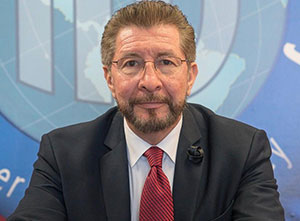Paradigm shift from crime in political power to the rule of law

By: Carlos Sánchez Berzaín - 22/09/2025
Share:
“21st-century socialism” imposed in the Americas the paradigm of the indefinite seizure and control of power with impunity based on the commission of all necessary crimes, expanding the Cuban dictatorship and its system to Venezuela, Nicaragua, Bolivia, and Ecuador (liberated). Crime as a system for seizing power was established as a successful model attacking the national security of democracies, but now we are witnessing the possibility of a shift to the “rule of law.”
A paradigm is a model, an example. In the social sciences, a paradigm is comparable to the concept of groupthink, or mentality, as a body of ideas, methods, and theoretical assumptions that are held and validated, and that includes a series of behaviors, attitudes, and beliefs. What 21st-century socialism achieved in the Americas was “a shift from the basic assumptions”—a substitution—of freedom, respect for human rights, political institutions, popular sovereignty, democracy, and their essential elements, to the brutal subjugation of peoples through crime.
This is not a revolution of crime, nor of crime operating revolutions; it is a "successful alibi" for criminals usurping positions, dignities, immunities, representations, and privileges, supplanting the sovereignty of peoples, and imposing populist narratives to justify and seek the legalization of crime. A complete subversion of the principles and values on which civilization is founded.
Venezuela's oil money was the foundation for corruption, emblematic of which was the Lava Jato case involving Brazilian federal funds controlled by Lula da Silva, drug trafficking that organized the "narco-states," state or domestic terrorism against peoples and international terrorism, forced migration, transnationalized common crime, human trafficking, destabilization of governments, conspiracies, extortion, protection and re-identification of criminals, terrorist training, cyberattacks, creation and dissemination of fake news, character assassination, and bloody crimes. There is no crime that the dictatorships of 21st-century socialism and its systems have not ceased to perpetrate.
By controlling political power and representation in subjugated countries, they promoted their international agenda of legitimizing crime. With anti-imperialist rhetoric, they made the legalization of cocaine and drug trafficking a national issue, used sovereignty to protect their crimes and criminals, presented crimes as justification for poverty while driving people into misery, operated multilateral international organizations to paralyze justice and guarantee impunity, persecuted democratic leaders, replaced education with indoctrination, a free press with propaganda, and more.
The paradigm of crime as a system for accessing and holding political power indefinitely and with impunity is another crime; it's a real criminal competition, but it has been in place for nearly 25 years, and the dictatorships of Cuba, Venezuela, Bolivia, and Nicaragua, and the para-dictatorial governments of Lula in Brazil, Sheinbaum in Mexico, Petro in Colombia, and Boric in Chile, all support it. It's not a political or ideological issue; organized crime cannot be recognized as an ideology because "crime is an act that involves individual and antisocial motives that affect social integrity."
The restoration of the international and domestic "rule of law" in the Americas to end the paradigm of organized crime in power is an existential imperative. Countries that underestimated, ignored, or acquiesced in crime's grip on power, coexisting with it, are victims of extremely serious consequences that affect their internal security, democratic stability, economy, and development.
There's nothing to agree upon, reach a consensus, or study; there's just compliance. Everything is legislated and constitutes international obligations contained in the Charter of the United Nations, the Charter of the Organization of American States, the Inter-American Democratic Charter, the American Convention on Human Rights, the United Nations Convention against Transnational Organized Crime (the Palermo Convention), the United Nations Convention against Illicit Traffic in Narcotic Drugs and Psychotropic Substances, the Inter-American Convention against Terrorism, and dozens of other international agreements.
The new United States foreign policy is expanding across the region with the growing support and actions of democracies, and the breaking point is in Venezuela. The end of the paradigm of crime in political power depends on the fate of the transnational organized crime group that holds power and has been identified as the "Cartel of the Suns."
It is happening and we will witness the end of the paradigm of crime in political power.
*Lawyer and Political Scientist. Director of the Interamerican Institute for Democracy
«The opinions published herein are the sole responsibility of its author».